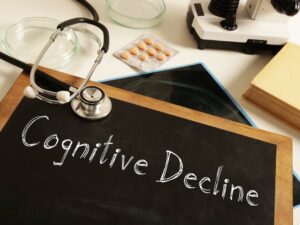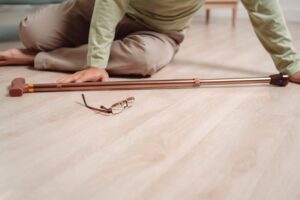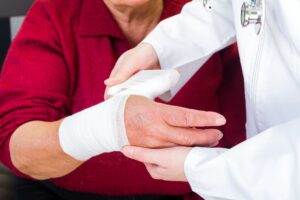When Cognitive Decline Causes Elderly Falls, is the Nursing Home to Blame?
Abuse and Neglect, Nursing Home AbuseWhen cognitive decline leads to elderly falls in a nursing home, you should consider all aspects of the situation before assigning blame. The decline in mental abilities can include memory loss, confusion, and impaired judgment, making it challenging for older adults to get around their environment safely.
Nursing homes have a duty to provide a safe environment for their residents, which raises the question of whether the nursing home can be held solely responsible for falls that occur due to cognitive decline. If you or a loved one have experienced a fall in a nursing home resulting from cognitive decline, be sure to seek legal advice from a firm that focuses on nursing home injuries to handle the intricate aspects of your case. Contact an experienced nursing home lawyer today for guidance and support on your journey toward seeking justice.
Understanding Cognitive Decline and Falls

Cognitive decline is a natural part of the aging process, affecting many older adults. It can manifest as a decline in memory, attention, language, and problem-solving abilities. As cognitive decline progresses, individuals may experience difficulty with mobility and balance, increasing their risk of falls. In a nursing home setting, where residents may already have underlying health conditions and physical limitations, the impact of cognitive decline on fall risk is even more significant.
However, it is important to note that not all nursing home falls are due to cognitive decline. Other factors, such as environmental hazards, medication side effects, and inadequate staffing levels, can also contribute to falls. When cognitive decline is a contributing factor, it introduces additional complexities in determining liability.
Assessing the Role of Negligence in Elderly Falls
If a nursing home fails to fulfill its duty of care and a resident with cognitive decline experiences a fall, it may be considered negligence. Negligence occurs when a healthcare provider or facility fails to provide the expected level of care, harming the patient. In the case of elderly falls related to cognitive decline, negligence may involve a lack of supervision, failure to implement appropriate safety measures, or inadequate staffing levels to assist residents with mobility issues.
The Duty of Care: Nursing Home Responsibility for Fall Prevention
Nursing homes have a legal responsibility to provide a safe and secure environment for their residents. This includes taking measures to prevent falls, especially in cases involving cognitive decline. The duty of care also includes regularly assessing residents’ physical and mental health, identifying potential risks, and implementing appropriate fall prevention strategies. The nursing home is responsible for ensuring adequate measures are in place to protect residents from harm.
The Role of Nursing Homes in Fall Prevention
Nursing homes have a duty to provide a safe environment for their residents, including measures to prevent falls. It is their responsibility to assess each resident’s risk of falling and implement appropriate interventions to minimize that risk. These interventions may include:
- Regular monitoring and assessment of residents’ cognitive and physical abilities
- Implementation of individualized care plans to address specific needs and risk factors
- Maintenance of secure and hazard-free environments
- Provision of assistive devices and mobility aids, such as handrails and walkers
- Staff training on fall prevention strategies and protocols
By fulfilling these responsibilities, nursing homes aim to ensure the safety and well-being of their residents. However, when a resident with cognitive decline experiences a fall, it is important to determine whether the nursing home took all necessary precautions to prevent the fall and mitigate the effects of cognitive decline on their resident’s safety.
Other Factors that Contribute to Nursing Home Falls
Nursing home falls can have devastating consequences for elderly residents. While cognitive decline may contribute to these falls, it is essential to consider additional factors that can increase the risk of accidents. Some of these factors include:
Environmental Hazards

Nursing homes have a responsibility to maintain a safe environment for their residents. However, failure to address environmental hazards can lead to serious accidents. Common environmental hazards that contribute to nursing home falls include:
- Slippery or wet floors
- Poor lighting in hallways and common areas
- Cluttered walkways
- Uneven or poorly maintained flooring
- Lack of handrails or grab bars in bathrooms and stairwells
If nursing homes do not address these hazards, they can be held accountable for any falls that occur as a result.
Understaffing and Inadequate Supervision
Understaffing is a prevalent issue in many nursing homes. When there aren’t enough staff members to adequately supervise residents, the risk of falls increases. Furthermore, inadequate supervision may lead to delayed assistance for residents who require help with mobility and daily activities. Nursing homes have a duty to provide sufficient staff to ensure the safety of their residents. Legal action may be warranted if understaffing or inadequate supervision contributed to a fall.
Medication Side Effects
Many elderly residents in nursing homes take multiple medications, which can have side effects such as dizziness, drowsiness, and impaired coordination. These side effects increase the risk of falls. Nursing homes have a duty to monitor and manage residents’ medication regimens to minimize these risks. If medication mismanagement or negligence led to a fall, it may be grounds for a legal claim.
Determining Liability in Cases of Cognitive Decline-Related Falls
Assigning liability in cases of cognitive decline-related falls can be challenging due to the multifaceted nature of the issue. It requires carefully examining the circumstances surrounding the fall and understanding the resident’s cognitive abilities and limitations. Below are some aspects that should be considered when determining liability:
Adequacy of Fall Prevention Measures
One key aspect to consider is whether the nursing home implemented appropriate fall prevention measures for residents with cognitive decline. This includes regularly assessing their cognitive status and adjusting their care plans accordingly. If it is determined that the nursing home failed to implement adequate fall prevention measures, they may be held partially or fully liable for the resident’s fall.
Communication with Family Members
Nursing homes have a duty to communicate with the resident’s family members about any changes in their cognitive status or increased fall risk. This ensures that appropriate precautions can be taken to prevent falls. Suppose the nursing home failed to inform the family members of the resident’s cognitive decline or did not involve them in decision-making regarding fall prevention. In that case, it may impact their liability in the event of a fall.
Documentation and Monitoring
Thorough documentation and monitoring are significant in assessing liability in cases of cognitive decline-related falls. The nursing home should maintain accurate records of the resident’s cognitive abilities, fall risk assessments, and any interventions implemented. If it is found that the nursing home failed to document or monitor the resident’s cognitive decline adequately, it may raise questions about their level of care and accountability.
Staffing and Training for Fall Prevention
Proper staffing levels and comprehensive training protocols are crucial in preventing falls among nursing home residents with cognitive decline. Staff members should receive specific training on identifying risk factors, implementing safety measures, and providing assistance to residents who require extra support. Additionally, having an adequate number of staff members available ensures that residents can receive timely assistance to prevent falls and minimize the risk of injury.
Identifying the Warning Signs: How to Recognize Potential Negligence
Family members and loved ones play a vital role in recognizing potential signs of negligence that may contribute to elderly falls in nursing homes. Some warning signs to look out for include unexplained injuries, frequent falls, inadequate supervision, lack of mobility assistance devices, and staff members who seem overwhelmed or unable to meet residents’ needs. If any of these signs are observed, it is imperative to address the concerns with the nursing home administration and, if necessary, seek legal guidance.
The Investigation Process: Building a Strong Case for Negligence
When pursuing a case against a nursing home for negligence in the context of elderly falls related to cognitive decline, a thorough investigation is necessary. This process involves gathering evidence such as medical records, incident reports, witness statements, and expert opinions. Building a strong case requires demonstrating that the nursing home had a duty of care to the resident, failed to fulfill that duty, and that this failure resulted in the resident’s fall and subsequent injuries.
Common Injuries in Nursing Home Falls

When an elderly resident falls in a nursing home, they are vulnerable to a range of injuries. Some of the most common injuries resulting from nursing home falls include:
Fractures
Fractures are a prevalent injury in nursing home falls, with the hips, wrists, and ankles being particularly vulnerable. The impact of a fall and the fragility of elderly bones can lead to fractures that require extensive medical treatment and rehabilitation.
Head Injuries
Head injuries can have serious consequences for elderly individuals. The impact of a fall can cause traumatic brain injuries (TBIs), concussions, and other head traumas. These injuries may lead to cognitive impairment, changes in mood or behavior, and physical disability.
Soft Tissue Injuries
Soft tissue injuries, such as bruises, sprains, and strains, are also common in nursing home falls. While these injuries may not be as severe as fractures or head injuries, they can still cause significant pain and discomfort for the resident.
Compensable Damages in a Nursing Home Fall Case
If you or your loved one has suffered an injury in a nursing home fall, it is imperative to understand the compensable damages you may be entitled to. Compensable damages in a nursing home fall case may include:
Medical Expenses
Nursing home fall injuries often require extensive medical treatment, including hospital stays, surgeries, medications, physical therapy, and rehabilitation. You may be entitled to compensation for these medical expenses, both past and future.
Pain and Suffering
Elderly individuals who fall in nursing homes may experience significant pain and suffering as a result of their injuries. They may also endure emotional distress, loss of enjoyment of life, and changes in their independence and mobility. Compensation for pain and suffering can help alleviate these burdens.
Loss of Consortium
If the fall results in severe injuries or disability, the injured individual’s spouse may claim loss of consortium damages. Loss of consortium refers to the loss of companionship, support, and intimacy that the spouse experiences due to the injury.
Wrongful Death Damages
In tragic cases where a nursing home fall leads to the wrongful death of a resident, the surviving family members may be eligible to pursue wrongful death damages. These damages can include funeral and burial expenses, loss of financial support, loss of companionship, and more.
Seeking Legal Advice in Cognitive Decline-Related Fall Cases

If you or a loved one has experienced a fall in a nursing home due to cognitive decline, it’s in your best interest to get legal advice from a skilled attorney who is experienced in nursing home fall cases. Understanding and managing the legal ins and outs of these cases requires experience and a deep understanding of the relevant federal and local laws and regulations. An experienced nursing home lawyer will evaluate the details of your case, collect valuable evidence supporting your claim, and advocate for your rights.
By consulting with a nursing home lawyer, you can:
- Gain a clear understanding of your legal options and rights
- Determine whether there are grounds for a lawsuit against the nursing home
- Obtain guidance on how to handle the legal process effectively
- Seek compensation for medical expenses, pain and suffering, and other damages
Contact a Seasoned Nursing Home Attorney for the Guidance and Support You Deserve
When cognitive decline causes elderly falls in nursing homes, determining liability can be a complex process. Nursing homes have a duty to provide a safe environment for their residents. Even though the progression of cognitive decline may be inevitable in some cases, they must adjust their standards of care to keep residents as safe as possible.
Determining liability requires a detailed examination of the circumstances surrounding the fall and an understanding of the nursing home’s responsibility in preventing falls in residents with cognitive decline. Contact a seasoned personal injury attorney as soon as possible for the guidance and support you need on your journey to seeking justice for your loved one.
Nathan Hughey, an attorney and fourth-generation South Carolinian, founded Hughey Law Firm in 2007. Before that, he spent five years defending nursing homes and insurance companies. Leveraging his experience, he now advocates for those injured or wronged by such entities, securing over $220 million in verdicts and settlements.
